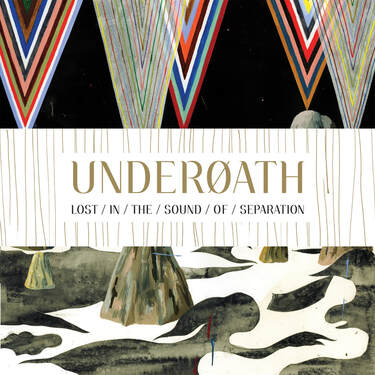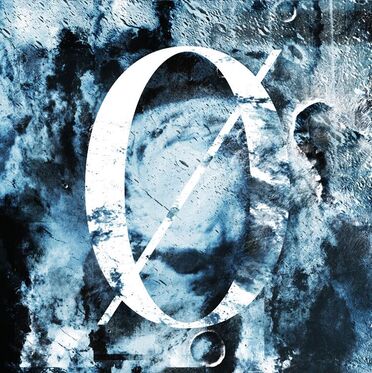|
Examining the Years 2004 to 2019 Written by: Ancient Hand Underoath: A group of musicians that stretch the definition of “metalcore” to its limits. Also defined as: “Christian Metalcore”; more accurately defined as: A tidal wave of experimentation in a dry desert of formulaic metalcore in the mid-2000s (with the exception of Converge).  After years of experimenting with black metal sounds and lyrics dealing with topics ranging from sexual assault to failing relationships, all under the lens of Christian faith, Underoath reinvented itself. With a new vocalist, Spencer Chamberlain, front-manning the group, the sound of the band began an evolution that would never cease-- even to this day. This era of Underoath, often dubbed “The Spencer Era,” is all the band considers themselves to be nowadays, even stating that their famous album, They’re Only Chasing Safety, is their “first album.” To many fans, this is a slap in the face to the band’s beginnings, but it is important to note the drastic shift between the band’s first 3 releases (Act of Depression, Cries of the Past, and The Changing of Times) and their world-famous 2004 release, They’re Only Chasing Safety. While I will not spend my time discussing these first few releases, I still do consider them a part of Underoath. What I do want to discuss are the many aspects of the band post-2003. The shift in the Underoath’s sound, musical stylings, lyrics, and approach to making music all culminate in a band that can only be described as important.  Underoath always boasted talent. That much is clear from the opening riff of “The Last” off the band’s release Cries of the Past. However, Underoath lacked the reach in their earlier years that would give them the potential to become a household name for a number of years in the mid-2000s. With They’re Only Chasing Safety, Underoath released their tight grip on the desire to be heavy and brooding and allowed themselves to reach accessibility, catchiness, and (dare I say?) fun. The hooks and choruses on their “first album” have been stuck in the heads of listeners for over 15 years. This much is evident from their recent show in Tampa, Florida at the Yuengling Center on December 14th, 2018. Before playing their popular song, “A Boy Brushed Red, Living in Black and White,” Spencer told the audience that the band would play “[the audience’s] favorite song, but [they] had to promise to stick with [the band] after the song was over.”  Making an album that can sell over 500,000 copies and be considered a metalcore album is almost unheard of nowadays. The genre is full of bands filling in the same formulas over and over again in an attempt to create a modicum of success that will project them into opening for bigger heavyweights in the genre. During this time, however, Underoath was a cutting-edge entity that managed to blend the stylistic crooning of pop-punk (the bridge of “Down, Set, Go!”) with the ferocity found in bands like Converge (“I Don’t Feel Very Receptive Today”). This concoction of melody and fury landed the band in the forefront of the alt-metal or radio metal genre. Rather than soil their sound with overproduced and glamorizing synthesizer, Underoath decided to follow up their 2004 smash hit with a darker, atmospheric gaze into depression, self-hatred, and substance abuse. Define the Great Line is considered by many to be Underoath’s best album. While I find “best” to be a very objective term and one that is hard to use with Underoath, given how different all of their full-lengths sound, I do consider this to be not just my favorite Underoath album, but my favorite album of all time. Define the Great Line is not a record that is easy to emotionally digest. The opening song roars with positive reinforcement (“Clear this room from your lungs/ And pull yourself together man”), but the title of the song directs the lyrics not to the listener, but to the howler himself: “In Regards to Myself.” The band chooses to follow this song with lyrical cries of trying to do better and find better circumstances to exist in (“A Moment Suspended in Time”): “Under my desk this can't be it/ I'm only dreaming, I've got to be dreaming/ But I can't get up. No time to talk, not this time, this is my place/ This is where I arrange.” These howling cries wind through an album littered with magically dark influences; from the grinding electronics of “You’re Ever So Inviting” to the post-rock atmosphere of “Casting Such a Thin Shadow,” the journey Underoath takes the listener on is one of self-discovery, which does not necessarily lead to a happy destination. While the things we find out about ourselves may not always be positive, it is important to accept these flaws and know which battles to pick. Define the Great Line concludes on a moment of personal reservation and a desire to do and be more: “Wash away what they thought of you/ Because in this place, we're all as good as dead/ End cycle…” “To Whom It May Concern” leaves a post-rock hum in the ears of listeners and hope in the hearts of those fighting an emotional war within themselves. While the album seems to follow a similar structure to their previous one, Underoath’s musical approach on this album is anything but similar to the pop-punk attitude and summertime angst of their previous outing. On Define the Great Line, the group goes heavier, faster, and harder than their younger selves did on They’re Only Chasing Safety. The band makes an incredibly grand statement through their words and bpms. This grandiose proclamation, however, is soon completely done away with by the band’s follow-up.  Lost in the Sound of Separation comes just 2 years after Define the Great Line, but the pure ferocity and pain expressed on this LP is decades of trauma beyond the previous release. Stripping back the dense and airy atmospheric production, Underoath turns the volume up to 11 and the production quality down quite a bit. Not only do the howls of Chamberlain sound like a man screaming his last rites, the lyrics dismantle his previously positive sentiments as well. On “A Fault Line, a Fault of Mine,” Chamberlain yells: “I was lying when I said/ I was looking north/ I was too scared to show what I am,” completely undoing the positive message of “To Whom It May Concern” (“It's time for you to press on/ This is not your war/ Set your sights to North and press on… Press on!”). The album not only leaves a bitter taste in the mouth of personal growth, it also condemns the modern world to an apocalypse on the track “Emergency Broadcast: The End is Near” with the lyrics, “We always said it wouldn't end/ It wouldn't end up like this/ We are the cancer/ We are the virus.” The nihilistic themes continue throughout the hellscape of Lost in the Sound of Separation; even the brief moments of respite (“Too Bright to See, Too Loud to Hear” and “Desolate Earth: The End is Here”) are filled with sorrow and pain. Despite the negative emotions conveyed on the album, the response from fans was overwhelmingly positive. This LP houses some of Underoath’s tightest performances, some of Gillespie’s strongest drumming, and consistently emotional themes that are revisited and built upon. Despite my favorite album from Underoath being Define the Great Line, I would have to say that I believe their best album is Lost in the Sound of Separation. Even to the end, the sorrow of the album is palpable; the final words of the album ring out as “Oh God, save us all!” However, the band’s future years show that this plea would go unanswered.  During the touring cycle of Lost in the Sound of Separation, longtime member, drummer, and singer, Aaron Gillespie, left the band. Following the departure of 1/6th of the band, Underoath entered the studio and recorded a follow-up to their most pained release. Rather than dive deeper into the depraved nature of the animalistic sounds on that album, Underoath sought reinvention and experimentation. Ø (Disambiguation) lives up to its name. There is no ambiguity found on this release, and the songs are submerged in experimentative electronics and technical drumming, courteously provided by Daniel Davidson (of Norma Jean and Every Time I Die). The bookends of the album (“In Division” and “In Completion”) are the borders of an abyssal examination of the self and the collective. Songs like “My Deteriorating Incline” make use of vivid grotesque imagery involving torture and mutilation, “Down here I tear out my veins/ And tie them to the chair/ This goes on and on and on/ Unraveled in contortions, I run for the door/ This goes on and on and on,” before collapsing into a moment of self-realization: “So I catch a glimpse of my own reflection/ From a shard of glass left on the floor… I'll change for the better/ It can't get much worse/ I'll swallow my own pride/ And then accept defeat.” It is also important to note that this was the album where Underoath first began to lose their identifier as a “Christian metalcore band.” The lyrics of “My Deteriorating Incline,” and many others, reflect this desire to evolve into something different. This new identity is one of looking inward at one’s flaws and directing anger outwards; the lyrics of “Catch Myself Catching Myself” showcase this external anger in the final lines: “I’m burning them alive/ I hear them begging and pleading.” Ø (Disambiguation) is an aggressive stampede through the darkest recesses of Chamberlain’s mind, and the instrumentals back this up perfectly. It’s less depraved and pained than the band’s previous album, but it is more aggressive and surreal. Underoath crafted an incredible album that represents a strange time for the group. The experimental sounds mirror the changes in the band with precision that is strengthened by the technical stylings of Davidson’s drumming. The eerie synth work of Chris Dudley submerges the album in hellish depths of bass and powerful synth.  This abyssal location would, for a time, be where Underoath rested. They broke up in early 2013 and said farewell at Jannus Live in Saint Petersburg, Florida. On that stage in January of 2013, Underoath destroyed many of their instruments and threw them into the crowd, effectively memorializing themselves by showing that their music and legacy was no longer their own and that those things now belonged to the fans. The fans of Underoath were not going to let that legacy die, however. For years, people commented on every photo posted by anyone in the band pleading for a reformation— a rebirth. Within a few years time, these pleas would be answered. After releasing Tired Violence, a documentary detailing the death of the band, Underoath began to reform behind closed doors as a collective of friends and brothers. Out of the conversations came the idea of performing Define the Great Line in its entirety with no announcement, no promotion, and no full-fledged tour. These conversations eventually grew into a mammoth of an idea: repressing They’re Only Chasing Safety and Define the Great Line on vinyl; playing both albums back to back on tour; and touring the United States, Australia, and Europe. Dubbed “The Rebirth Tour,” Underoath began with a secret show at the Crowbar in Tampa, FL. A show that saw people lining outside the venue for tickets many hours before the band had even arrived. The first true show of the tour, however, came in the form of another Jannus Live performance: the same stage, more than 3 years later. A rebirth of Underoath. I was fortunate enough to be at this show and see the band I loved more than any make it clear that they had not lost their melancholic fury during their time off. I sang along to every song and cried at the same parts I had when I listened to the band in high school. I took pride in the tattoo I had gotten of their symbol just a month before this rebirth was announced. Being a college freshman with no car, I paid a friend of mine to take me to the show. She let me jam out to the two albums I’d be hearing later that night the whole way to Saint Petersburg (about a 3 hour drive for us). She hung out and waited for the show to end. She let me talk about the show and how much I loved it the whole way home. I stumbled inside my freshman year dorm with a T-shirt and 2 posters I had purchased and passed out on my bed. I woke up the next day with no voice and bags under my eyes, and I went to my job at a pizza place. It’s still one of the best memories of my life. Less than a year later, however, that same friend that gifted me such an incredible experience would die. I still think about her every time I hear “Writing on the Walls”— the same song that led Spencer to throw himself into the crowd and be whisked away by the love and support of those there to see him perform. I still think about how the posters that still occupy the pivotal space in my office would not be there without her. And now, multiple years later, Underoath have released their follow-up to Ø (Disambiguation) in the form of Erase Me. They have seen continued success in the face of naysayers, and they have proven that they didn’t need a religious aspect to their lyrics in order to retain supporters. Their updated biography on Spotify emphasizes this lost identity: “The band who once openly—and without apology—professed their faith-based worldview onstage nightly, have since moved beyond the realm of seemingly impenetrable polemics. At various junctures, Erase Me illustrates those moments of sanctuary, anxiety, betrayal and conflict that inevitably arise when humanity grapples with belief systems.” But that begs the question: How does Erase Me fit into the discography of Underoath? Quite simply, Erase Me is Underoath taking back their musical legacy. It’s a “thank you” to the fans for holding on to it, and it’s also a “give this back because it’s ours to do what we want with.” It’s a grand statement of clean production and filthy subject matter. It’s a showcase of Aaron’s incredible drumming abilities (“Rapture,” “On My Teeth”). It’s a proclamation of unworthiness (“I don’t deserve the life you give/ I don’t deserve the life you give,” [“ihateit”]). It’s an opportunity to say what they’ve always wanted to. While Erase Me did not connect with every fan, it served its purpose. There are some moments I don’t even fully love on the album, but this album wasn’t made for me. It was made by Underoath for Underoath. It’s an effective reclaiming of what made Underoath the incredible driving force that it was and still is. It’s simultaneously a slap in the face to doubters and a clap on the back to supporters. For me, Underoath is a sanctuary. Their music helped me grapple with the loneliness of my late teen years. Their lyrics helped me overcome betrayal and self-hatred. Their pummeling marches toward apocalypses-- both microcosmically and macrocosmically-- flooded by eardrums for years and continue to do so. My perspective on their music has certainly evolved over the course of my listening to them, and I love the new thoughts that I associate with their music. I adore the opportunity to be able to return to an old outlet for a new problem. I find safety and comfort in the relatability of the struggles of both Aaron Gillespie and Spencer Chamberlain. I seek forgiveness from myself and escape from the world when I play an Underoath record. As a fan of the band’s music and the evolution of the men that create it, I hope they find as much joy and solace in their chaotic riffs and pained cries as I do. Thank you, Underoath, for creating an environment that allows listeners to escape their problems and simultaneously face them, should they choose to do so. The discography of Underoath is a diary. It’s an outlet for the band and for fans to release the bad energy that plagues us— from normal everyday work stress to traumatic events like losing a loved one. Underoath exists to promote honesty— even when the truth isn’t pretty. And what’s a very honest thing is knowing when to hand over your legacy and when to take it back. Underoath lived, then died, then rebirthed, and now, Underoath has reclaimed. Now, it’s time to see how they plan on evolving their legacy.
0 Comments
Leave a Reply. |
Welcome!We provide thoughtful reviews of music that is heavy, gloomy...and loud enough to wake us from slumber. Written by a highfalutin peasantry. What are ye
All
|
 RSS Feed
RSS Feed